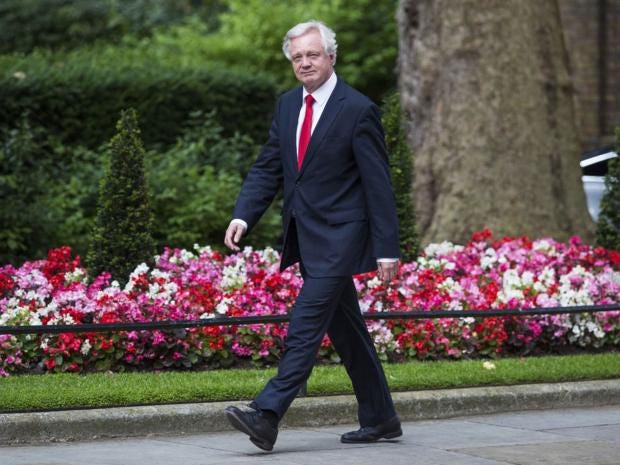
David Davis has been named Secretary of State for Leaving the European Union.
But the minister - a long time eurosceptic - had already outlined his vision for Brexit.
Writing on the Conservative Home website earlier in July, Mr Davis penned a piece entitled 'Trade deals. Tax cuts. And taking time before triggering Article 50. A Brexit economic strategy for Britain'.
Here are the key points from the article.
On 'Taking back control of trade...'
First of all, leaving the EU gives us back control of our trade policy... We can do deals with our trading partners, and we can do them quickly. I would expect the new Prime Minister on September 9th to immediately trigger a large round of global trade deals with all our most favoured trade partners. I would expect that the negotiation phase of most of them to be concluded within between 12 and 24 months
On 'Cutting taxes and cutting red tape – but protecting workers'
The flood of new regulation from Europe will be halted... There is also a political, or perhaps sentimental point. The great British industrial working classes voted overwhelmingly for Brexit. I am not at all attracted by the idea of rewarding them by cutting their rights. This is in any event unnecessary, and we can significantly improve our growth rate by stopping the flood of unnecessary market and product regulation. We should also continue with the programme of lessening the tax burden.
On 'Single market access – and why we should take time before triggering Article 50...'
The ideal outcome is continued tariff-free access. Once the European nations realise that we are not going to budge on control of our borders, they will want to talk, in their own interest. There may be some complexities about rules of origin and narrowly-based regulatory compliance for exports into the EU, but that is all manageable. We should work out what we do in the improbable event of the EU taking a dog in the manger attitude to Single Market tariff free access, and insist on WTO rules and levies, including 10 per cent levies on car exports. Let us be clear: I do not believe for a moment that that will happen, but let us humour the pre-referendum Treasury fantasy.
On 'Brexit - the picture'
So how will this look if we get it right? We will have a more dynamic economy, trading throughout the world. Our businesses will have greater global opportunities, and will be more competitive. There will be lower prices in the shops, once we are outside the Common External Tariff. There will be higher wages for the poorest. An immigration system that allows us to control numbers. Control of our laws, so our lives are not hampered by needless and restrictive regulations.
This approach should allow us to present to the British electorate in 2020 the early fruits of a successful global trade-based economic strategy as we build our place in the world.







